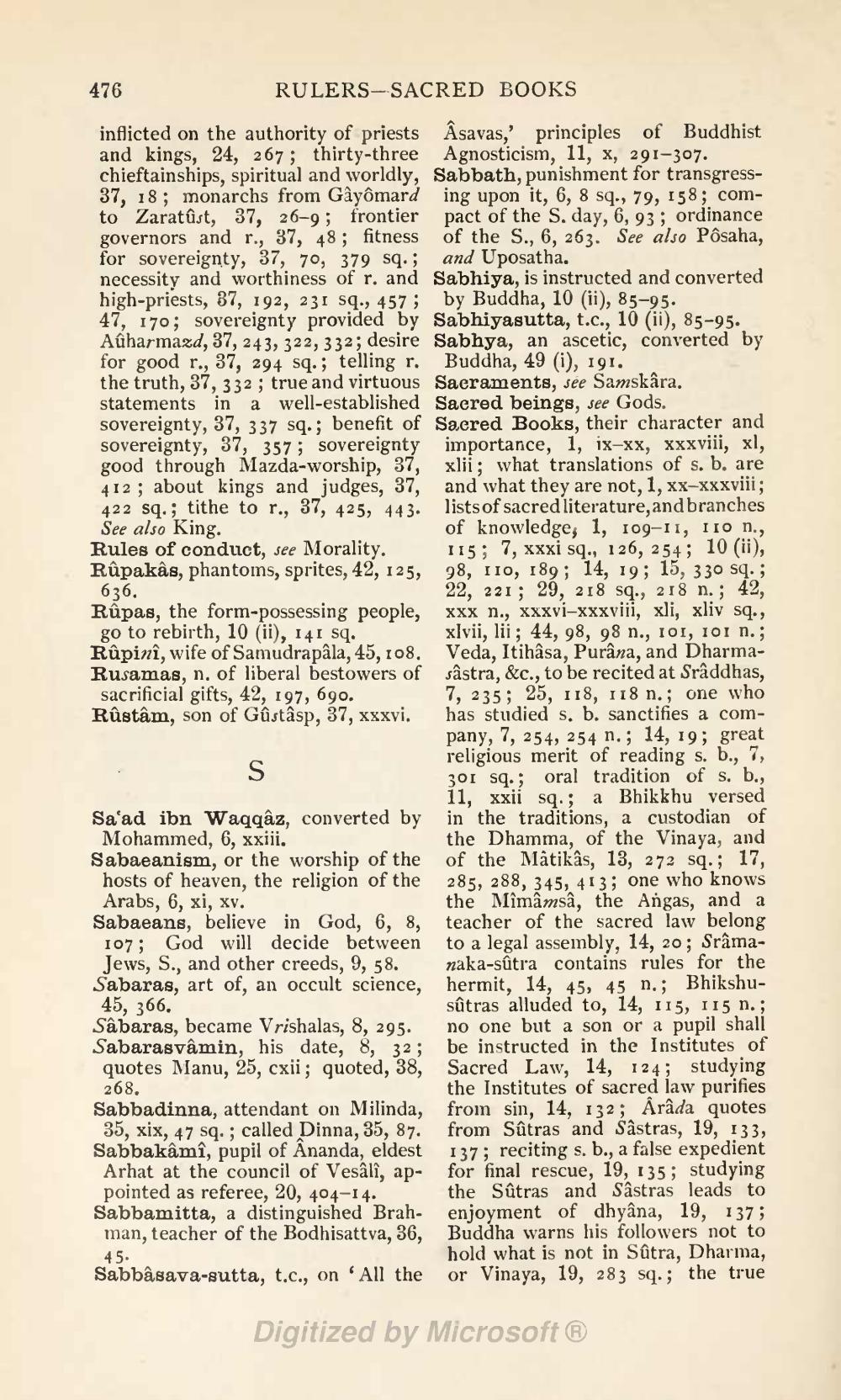________________
476
RULERS-SACRED BOOKS
inflicted on the authority of priests and kings, 24, 267; thirty-three chieftainships, spiritual and worldly, 37, 18; monarchs from Gâyômard to Zaratust, 37, 26-9; frontier governors and r., 37, 48; fitness for sovereignty, 37, 70, 379 sq.; necessity and worthiness of r. and high-priests, 37, 192, 231 sq., 457; 47, 170; sovereignty provided by Aûharmazd, 37, 243, 322, 332; desire for good r., 37, 294 sq.; telling r. the truth, 37, 332; true and virtuous statements in a well-established sovereignty, 37, 337 sq.; benefit of sovereignty, 37, 357; sovereignty good through Mazda-worship, 37, 412; about kings and judges, 37, 422 sq.; tithe to r., 37, 425, 443. See also King. Rules of conduct, see Morality. Rûpakâs, phantoms, sprites, 42, 125, 636.
Rupas, the form-possessing people, go to rebirth, 10 (ii), 141 sq. Rûpinî, wife of Samudrapâla, 45, 108. Rusamas, n. of liberal bestowers of sacrificial gifts, 42, 197, 690. Rûstâm, son of Gûstâsp, 37, xxxvi.
S
Sa'ad ibn Waqqaz, converted by Mohammed, 6, xxiii. Sabaeanism, or the worship of the hosts of heaven, the religion of the Arabs, 6, xi, xv. Sabaeans, believe in God, 6, 8, 107; God will decide between Jews, S., and other creeds, 9, 58. Sabaras, art of, an occult science, 45, 366.
Sâbaras, became Vrishalas, 8, 295. Sabarasvâmin, his date, 8, 32; quotes Manu, 25, cxii; quoted, 38,
268.
Sabbadinna, attendant on Milinda, 35, xix, 47 sq.; called Dinna, 35, 87. Sabbakâmî, pupil of Ânanda, eldest Arhat at the council of Vesâlî, appointed as referee, 20, 404-14. Sabbamitta, a distinguished Brahman, teacher of the Bodhisattva, 36,
45.
Sabbâsava-sutta, t.c., on 'All the
Âsavas,' principles of Buddhist Agnosticism, 11, x, 291-307. Sabbath, punishment for transgressing upon it, 6, 8 sq., 79, 158; compact of the S. day, 6, 93; ordinance of the S., 6, 263. See also Pôsaha, and Uposatha. Sabhiya, is instructed and converted by Buddha, 10 (ii), 85-95. Sabhiyasutta, t.c., 10 (ii), 85-95. Sabhya, an ascetic, converted by Buddha, 49 (i), 191. Sacraments, see Samskâra. Sacred beings, see Gods. Sacred Books, their character and importance, 1, ix-xx, xxxviii, xl, xlii; what translations of s. b. are and what they are not, 1, xx-xxxviii; lists of sacred literature, and branches of knowledge, 1, 109-11, 110 n., 115; 7, xxxi sq., 126, 254; 10 (ii), 98, 110, 189; 14, 19; 15, 330 sq.; 22, 221; 29, 218 sq., 218 n.; 42, xxx n., xxxvi-xxxviii, xli, xliv sq., xlvii, lii; 44, 98, 98 n., 101, 101 n.; Veda, Itihâsa, Purâna, and Dharmasâstra, &c., to be recited at Srâddhas, 7, 235; 25, 118, 118 n.; one who has studied s. b. sanctifies a company, 7, 254, 254 n.; 14, 19; great religious merit of reading s. b., 7, 301 sq.; oral tradition of s. b., 11, xxii sq.; a Bhikkhu versed in the traditions, a custodian of the Dhamma, of the Vinaya, and of the Mâtikâs, 13, 272 sq.; 17, 285, 288, 345, 413; one who knows the Mîmâmsâ, the Angas, and a teacher of the sacred law belong to a legal assembly, 14, 20; Srâmanaka-sûtra contains rules for the hermit, 14, 45, 45 n.; Bhikshusûtras alluded to, 14, 115, 115 n.; no one but a son or a pupil shall be instructed in the Institutes of Sacred Law, 14, 124; studying the Institutes of sacred law purifies from sin, 14, 132; Arâda quotes from Sutras and Sâstras, 19, 133, 137; reciting s. b., a false expedient for final rescue, 19, 135; studying the Sûtras and Sâstras leads to enjoyment of dhyâna, 19, 137; Buddha warns his followers not to hold what is not in Sûtra, Dharma, or Vinaya, 19, 283 sq.; the true
Digitized by MicrosoftR




